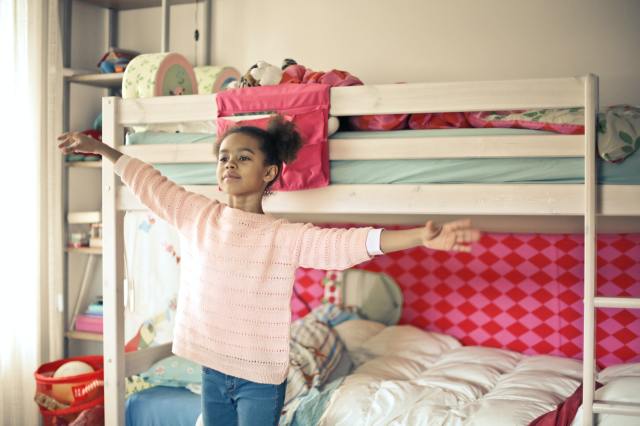For newly divorced moms and dads, moving to a new home can be another stressful layer to an already stressful situation.
Among kids, an unwanted move can result in feelings of sadness, anger, and resentment. Losing the home they know and love comes as a blow as another part of their lives spins out of control.
Here are a few tips to help kids transition to a new home after divorce:
1. Address any emotions your children may have about the move.
Moving homes brings about complex emotions children may not understand, even if they know what divorce is. You may believe acting happy and convincing them nothing is wrong is best. However, this behavior teaches children to avoid emotions and can result in long-term problems. Instead, address the feelings your children may be experiencing head-on. Start a conversation, then listen. Kristin Davin, Psy.D., a therapist from New York City, says, “It’s critical parents provide emotional space for their children to express how they’re doing so they not only feel safe but also understood.”
Having children read age-appropriate books about moving and handling change and calling on a therapist or child psychologist can help.
2. Make moving day as low-stress as possible.
Moving day won’t come without stress. That said, as a parent, you set the tone. “Children take their cues from their parents, so a parent’s ability to manage stress is key,” says Davin. If you’re pessimistic, your children will notice. They may then have trouble adjusting. Davin suggests parents talk with their kids beforehand. “The day doesn’t have to be stress-free. But talking to children before a big move about what would help them feel less stressed is wise. You want children to feel they’re part of the process and recognize you’re all in it together and still a family.”
Other ways to decrease stress on moving day include making sure you and your children are well-rested and well-fed. Also, keep a box of your children’s favorite possessions nearby and all in one place, so they’re readily available for the first night in their new environment.
Consider sending your children to their grandparents’ house or with another relative or friend for moving day and maybe a few days after it. With the kids away from the chaos, you’ll be better able to prepare your home for a peaceful transition.
3. Let your children decorate their room.
Your children should feel like the new house is their home, too. That’s especially true of their bedroom. Denise Allen, a Washington State-based organizational expert and the owner of Simplify Experts, recommends parents give children input in setting up their new space. “Allow them to feel like they have some ownership of the space and that it doesn’t just feel like a guest room.”
By letting kids decorate, it’ll feel like their personal space sooner. They’ll grow attached more quickly because they’ll feel personally invested. They may likewise gain a sense of control over their environment where it might’ve been lacking before. Not to mention, Allen says, “Parents will have more buy-in for the maintenance of the space if kids are proud of it.” Allen suggests parents be mindful of the activities that will take place in that area. Parents should consider whether kids will be studying in their room and if the setup plays well into their learning style. For example, is the lighting adequate for doing homework?
4. Establish a routine for your children.
Changing homes threatens stability, making it critical for parents to establish a routine as soon as possible for their children, even if it’s a new one. Kids want to know what’s around the bend. “Starting them off with a bit less stress will help them feel good and empowered,” says Davin.
A routine preoccupies children. It prevents them from fixating on unsettling events, keeping them grounded in the present and looking to the future. Dinner is at six o’clock, bedtime at eight. It also puts transitions into bite-sized pieces, which kids can manage. As they see that what you predict happens, they’ll worry less another change will come out of nowhere.
5. Keep the new space orderly.
Related to creating a routine for your family, especially children, is keeping your new space in order. Allen says, “A calm living environment offers a great sense of control and a place for the brain to relax.”
Moving also provides an excellent and often welcome opportunity to purge possessions that have been weighing you down. Children, even younger ones, can benefit from a purge and reorganization of their toys, games, and books. With clutter gone, kids can focus on the items that make them happy. Plus, they have room to put their stamp on the new space, making it their own.
As for moving forward, Allen says maintenance is critical. “Simple organizational systems are key, and the more visual they are, the better.”
6. Give kids time and space to adjust to their new home.
Divorced parents may want their children to immediately accept the new home, seeing it as a sign they’re coming to terms with the divorce. But just as you need to get used to your situation, your kids will, too. Davin says, “Thinking they should adjust in a certain way by a certain time puts pressure on children and can make them feel like something is wrong with them.” Instead, she recommends parents do check-ins and ask their kids what they need and how they’re doing while still giving them time and privacy to figure things out.
But more than anything, Davin says, “Let your kids know you’re around for them whenever they need you. It’s the people who live in a house, not the house itself, that make a home.”
RELATED:
Thinking about Divorce? Here are 10 Things Every Wife Should Know
5 Tips for Moms Dealing with Divorce
You’ve Got This: How to Find Support Before, During & After Divorce











